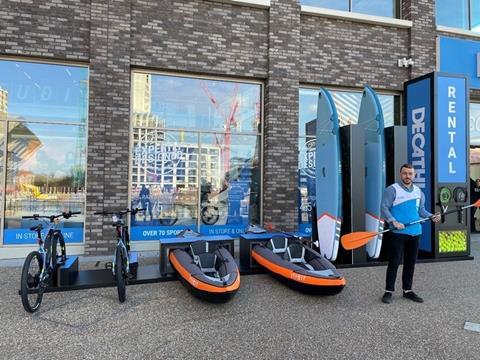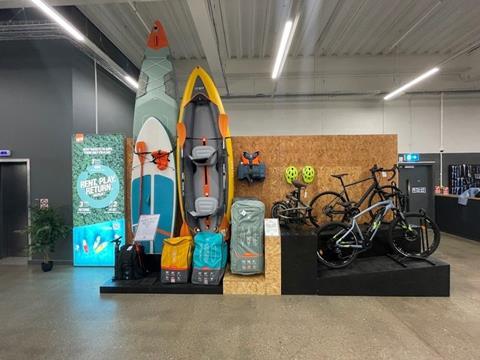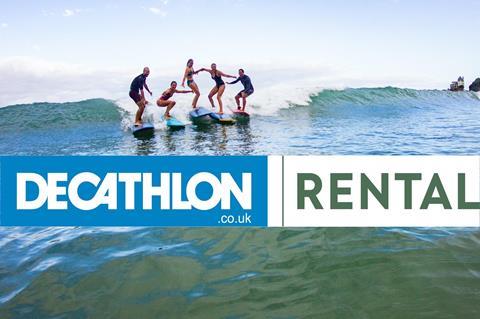The end of March 2023 brought great news for a start-up focusing on the circular economy: Finnish retail rental specialist Rentle announced that it had entered into a partnership with Decathlon, the world’s leading sports retail chain. This is on top of the more than 20,000 retailers in over 40 countries already using the Rentle platform. We explore what drove this partnership and the benefits of partnering with a rental platform specialist.
Decathlon UK launched its U.K.-wide rental service, built on Rentle’s platform, in the spring of this year, making it the first major sports retailer to offer sports rentals across all UK stores.
Research by Decathlon shows that the cost of buying equipment is one of the biggest barriers to people taking up a new hobby. Decathlon’s aim in choosing to offer a rental service with Rentle is to give people the opportunity to try out different sports without the financial commitment of buying equipment. The service allows customers to rent kayaks, SUP boards, bicycles, and much more.
Chris Allen, Decathlon UK’s sustainability manager, explains: “Despite having the appetite to try sports, committing to the cost of buying gear is one of the biggest barriers to people taking up something new. Rentals give customers across the U.K. the opportunity to overcome this challenge by discovering the joy of different activities at an affordable price and in a sustainable way.”

Recent funding will be used for product development
Securing the collaboration with Decathlon UK is the latest success for the business, which aims to empower commerce outside of ownership. In autumn 2022, Rentle raised €3.8 million from investors in its latest funding round.
Like any software platform, continuous product development is a must, so most of the funding will go towards that. Because the Rentle software platform is relied on by some of the world’s biggest operators, like Decathlon, Rentle is striving to hire people with world-class skills to continue to optimize its digital offerings.
Rentle’s latest feature is a subscription service that allows customers to rent a bike or a SUP board for the whole summer; a feature in which both large chains and individual retailers have shown interest in.
City bikes inspired the business idea
The idea for Rentle was born by three friends: Tuomo Laine, Toomas Kallioja, and Joel Mikkonen, who studied service design at Aalto University. Inspiration came from Helsinki’s city bikes, whose rental business was not yet smooth in the early 2000s.
“We thought about how to effectively share different things in the world, such as bikes. We quickly realized that the lack of supply meant that the retail sector did not have the infrastructure to run a rental service,” says Laine, CEO and co-founder of Rentle.
“With Rentle, we wanted to make the circular economy easy for retailers and provide consumers with a quality user experience. We wanted rental to be as easy as buying a glass of milk from a kiosk.”
The trio got to work and coded the first prototype of Rentle. The pilot customer was a company that rents out caravans. At the same time, they wondered who else would need an innovative rental platform.

Laine: “We observed that Finnish ski resorts were pioneers in the circular economy with their rental activities. They also provided a good and challenging development environment for the platform. We knew that if we understood the service environment of Finnish ski resorts and could offer something new to it, we would certainly succeed elsewhere in the world as well.”
Rentle’s first ski resort customer was Laajavuori, situated in Jyväskylä, back in 2019. The first version of the platform was designed to manage rental operations in a store environment. At Laajavuori, the platform focused on serving walk-in customers. During Covid, the platform was scaled up to also work in an online store, allowing customers to book and rent equipment remotely. This same mindfulness of customer needs and demands continues to shape the Rentle platform today.
“No platform can be developed in isolation from its customers, which is why our more than 20,000 retail customers in 40 countries are at the heart of what we do. Through them, we actively collect customer feedback and user experience, which is used for development. All the functionality offered by Rentle comes from our customers,” says Laine.
An easy way for retailers to participate in the circular economy
Although Rentle started with ski resorts and sports retailers, the platform for rental services sees no industry boundaries. Today, Rentle is used by clothing rental companies, shops that sell childcare products, event equipment rental companies, and Motonet, which rents almost everything from trailers to moving boxes. Driving circularity is at its heart.
“At Rentle, we feel that we are building a circular economy infrastructure and the more successful we are, the easier it will be for retailers to get involved in the rental business and extend the life of products and get a better return on their products,” adds Laine.
From the consumer’s point of view, the circular economy brings tangible benefits, such as access to more expensive and better-quality products without the big expenditure. This, in turn, brings a better customer experience, which improves customer loyalty.
Laine explains: “A better balance sheet allows retailers to invest in quality, repairability, and sustainability. As manufacturing costs continue to rise, the life cycle of a product needs to be extended. Most retailers understand this.”

Good for the environment and the bottom line
Many retailers may be reluctant to engage in rentals due to fears of revenue loss. Whilst understandable, this doesn’t take in the full picture of what rentals can bring (both financially and in terms of sustainability).
Speaking to Rentle, Sharon Poulter, commercial manager and lead of rentals in the Decathlon UK sustainability team, explained: “Despite the concern we hear from our store managers across the country, we don’t believe renting will have a negative impact on retail sales. However, in the long term, that’s exactly what we want to do – we want to replace a proportion of our sales with rentals, Second Life and repair, creating a more sustainable business model.”
Laine is also convinced that for many small businesses, offering rental services online brings sales upfront, as customers can book and pay for the product online: “This can significantly increase an entrepreneur’s annual revenue.”
According to Laine, however, it is worth remembering that you don’t have to rent out every product right away but can start with two bikes or a canoe.
In the end, one of the main advantages of Rentle and its rental possibilities is its versatility. “The same product can be for sale, for rent and, after retouching, for second-hand sales. Few platforms can offer such a life cycle for a single product,” concludes Laine.
Rentle key facts
- Founders Tuomo Laine, Toomas Kallioja and Joel Mikkonen
- Head office in Helsinki
- 28 employees
- Over 20,000 retail customers in more than 40 countries





